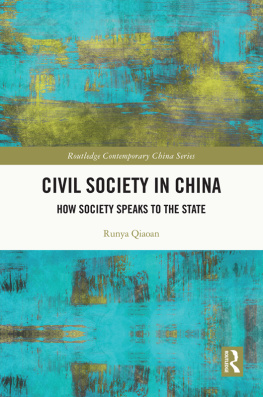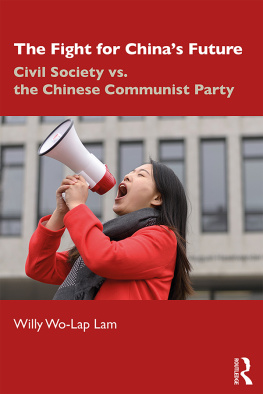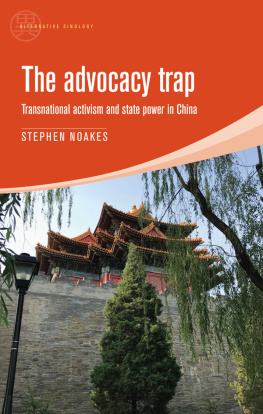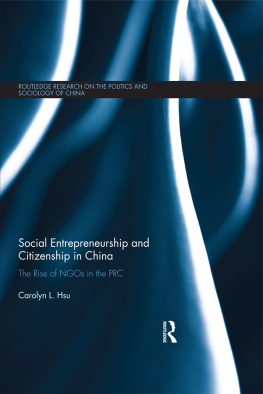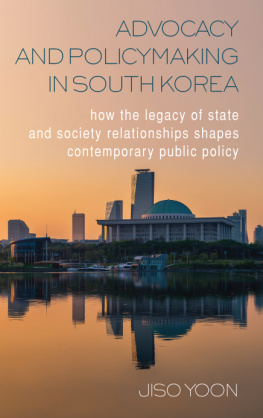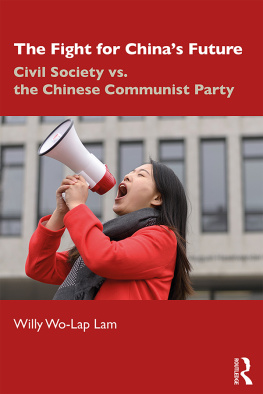Civil Society in China
Chinese civil society groups have achieved iconic policy advocacy successes in the areas of environmental protection, women's rights, poverty alleviation, and public health. This book examines why some groups are successful in policy advocacy within the authoritarian context, while others fail.
A mechanism of cultural resonance is introduced as an innovative theoretical framework to systematically compare interactions between Chinese civil society and the government in different movements. It is argued that civil society advocacy results depend largely on whether advocators can achieve cultural resonance with policymakers and the mainstream public through their social performances. The effective performance is the one in which advocators employ symbols embraced by the audience (policymakers and the public) in their actions and framings. While many studies have tried to explain the phenomena of successful policy advocacy in China through institutional or organizational factors, this book not only contains extensive empirical data based on field research, but also takes a cultural sociological turn to identify the meaning-making process behind advocacy actions.
Civil Society in China will appeal to students and scholars of sociology, political science, social work, and Chinese and Asian studies more broadly.
Runya Qiaoan is an assistant professor and senior researcher at Palacky University. She holds PhD in Sociology from Masaryk University and conducted study and research stays at University of Toronto, Utrecht University, and National Chengchi University, among others. Her recent publications appeared in Journal of Chinese Political Science, China Information, Social Anthropology, and Asia Europe Journal.
Routledge Contemporary China Series
222 Hegemony with Chinese Characteristics
From the Tributary System to the Belt and Road Initiative
Asim Dogan
223 Homeownership in Hong Kong
House Buying as Hope Mechanism
Chung-kin Tsang
224 Local Clan Communities in Rural China
Revolution and Urbanisation since the Late Qing Dynasty
Zongli Tang
225 China's Energy Security and Relations With Petrostates
Oil as an Idea
Anna Kuteleva
226 Ethnic Identity of the Kam People in Contemporary China
Government versus Local Perspectives
Wei Wang and Lisong Jiang
227 China's Globalization from Below
Chinese Entrepreneurial Migrants and the Belt and Road Initiative
Theodor Tudoroiu
228 Civil Society in China
How Society Speaks to the State
Runya Qiaoan
For more information about this series, please visit: https://www.routledge.com/Routledge-Contemporary-China-Series/book-series/SE0768
First published 2022
by Routledge
2 Park Square, Milton Park, Abingdon, Oxon OX14 4RN
and by Routledge
605 Third Avenue, New York, NY 10158
Routledge is an imprint of the Taylor & Francis Group, an informa business
2022 Runya Qiaoan
The right of Runya Qiaoan to be identified as author of this work has been asserted by her in accordance with sections 77 and 78 of the Copyright, Designs and Patents Act 1988.
All rights reserved. No part of this book may be reprinted or reproduced or utilised in any form or by any electronic, mechanical, or other means, now known or hereafter invented, including photocopying and recording, or in any information storage or retrieval system, without permission in writing from the publishers.
Trademark notice: Product or corporate names may be trademarks or registered trademarks, and are used only for identification and explanation without intent to infringe.
British Library Cataloguing-in-Publication Data
A catalogue record for this book is available from the British Library
Library of Congress Cataloging-in-Publication Data
Names: Qiaoan, Runya, 1988- author.
Title: Civil society in China : how society speaks to the state / Runya Qiaoan.
Description: 1 Edition. | New York, NY : Routledge, 2022. | Series: Routledge contemporary China series | Includes bibliographical references and index. | Summary: Chinese civil society groups have achieved iconic policy advocacy successes in the areas of environmental protection, women's rights, poverty alleviation, and public health. This book examines why some groups are successful in policy advocacy within the authoritarian context, while others fail. A mechanism of cultural resonance is introduced as an innovative theoretical framework to systematically compare interactions between Chinese civil society and the government in different movements. It is argued that civil society advocacy results depend largely on whether advocators can achieve cultural resonance with policymakers and the mainstream public through their social performances. The effective performance is the one in which advocators employ symbols embraced by the audience (policymakers and the public) in their actions and framings. While many studies have tried to explain the phenomena of successful policy advocacy in China through institutional or organizational factors, this book not only contains extensive empirical data based on field research, but takes a cultural sociological turn to identify the meaning-making process behind advocacy actions. Civil Society in China will appeal to students and scholars of sociology, political science, social work, and Chinese and Asian studies more broadly-- Provided by publisher.
Identifiers: LCCN 2021030283 | ISBN 9780367480912 (hardback) | ISBN 9780367502744 (paperback) | ISBN 9781000449815 (adobe pdf) | ISBN 9781000449884 (epub)
Subjects: LCSH: Civil society--China. | Non-governmental organizations--China. | Political culture--China. | China--Politics and government--21st century.
Classification: LCC JQ1516 .Q2543 2022 | DDC 320.60951--dc23
LC record available at https://lccn.loc.gov/2021030283
ISBN: 978-0-367-48091-2 (hbk)
ISBN: 978-0-367-50274-4 (pbk)
ISBN: 978-1-003-04931-9 (ebk)
DOI: 10.4324/9781003049319
Typeset in Times New Roman
by KnowledgeWorks Global Ltd.
To my grandpa
Contents
List of table
1 Civil society in China?
2 At the crossroads of two theoretical traditions
3 Chinese cultural genealogy
4 Environmental policy advocacy
5 Beyond environmental issues
Conclusion
- Half Title
- List of table
- 1 Civil society in China?
- 2 At the crossroads of two theoretical traditions
- 3 Chinese cultural genealogy
- 4 Environmental policy advocacy
- 5 Beyond environmental issues
- Conclusion
2.1 The mechanism of cultural resonance in social performance.
4.1 Successful cultural resonance mechanism of case 1.
4.2 Successful cultural resonance mechanism of case 2.
4.3 Failed cultural resonance of case 3 from 2005 to 2010.
4.4 Successful cultural resonance of case 3 from 2011 to 2015.
4.5 Successful cultural resonance mechanism of case 4 from Chinese medicine supporters.
4.6 Failed cultural resonance mechanism of case 4 from ENGOs.
5.1 Successful cultural resonance mechanism of case 5.
5.2 Successful cultural resonance mechanism of case 6.

